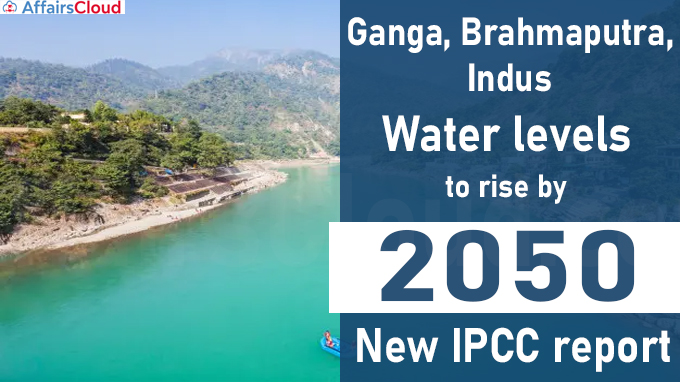
As per the report of Climate Change 2022, the Sixth Assessment – Working Group II reports on Impacts, Adaptation and Vulnerability by Intergovernmental Panel on Climate Change (IPCC) there will be rise in water level of The Indus, Ganga and Brahmaputra river basins by 2050 and 2100.
i.The rise in water ‘runoff’ is due to the rise in global warming.
ii.The first Assessment report was introduced in 1990, later it was followed by four subsequent reports that came out in 1995, 2001, 2007, and 2015 for climate change.
The Intergovernmental Panel on Climate Change (IPCC) Report:
i.As per the second part of the sixth assessment report by IPCC, deals with climate change impacts, risks and vulnerabilities, and adaptation measures.
ii.The first part dealt with climate change, scientific basis.
iii.Regional assessments were also made for the first time by the panel in mega cities.
iv.According to the report the run-off could increase 3-27 percent by mid-century in the following rivers,
- 7-12 percent in the Indus.
- 10-27 percent in the Ganga.
- 3-8 percent in the Brahmaputra.
Reason For The Runoff:
i.Increase in run-off in the upper Ganga and Brahmaputra is due to a rise in precipitation.
ii.In the Indus, it is due to accelerated melting snow.
iii.Extreme precipitation events to cause more flash flood events in the future.
Note:
“River Runoff” refers to water flow in a river water system from the sources such as rainfall, melting snow and groundwater.
Vulnerable Area:
i.India is one of the most vulnerable countries in terms of the population that will be affected by sea-level rise.
ii.Around 45% of the global population lives in the highly vulnerable area.
iii.Cities in the vulnerable area face high risk of climate disasters, including sea-level rise, flooding, and heatwaves.
iv. Mumbai will face high risk of a sea-level rise and flooding, while Ahmedabad faces a serious heatwave danger.
v.Cities including Chennai, Bhubaneshwar, Patna and Lucknow, approaching dangerous levels of heat and humidity.
vi.The hydrological extremes of the Upper Indus, Ganges and Brahmaputra river basins may have increased magnitude towards the end of the 21st century by applying Representative Concentration Pathway (RCP) 4.5 and 8.5 scenarios, due to increase in precipitation.
Impacts due to Climate Change:
i.In Asia’s sub-tropical regions, climate change leads to water-borne diseases such as dengue or malaria.
ii.The report has also said deaths related to respiratory, circulatory, diabetic, and infectious diseases, and infant mortality are likely to go up with a rise in temperature.
iii.Increasing frequency of extreme weather events such as flooding and drought, heatwaves and even air pollution will cause allergic diseases, under-nutrition, and even mental disorders.
Towards the Reduction of Global Temperature:
i.Reports have been produced in the Paris Agreement and the earlier Kyoto Protocol.
ii.The Paris Agreement, on the basis of the Fifth Assessment Report, seeks to contain the global temperature rise well below 2°C from pre-industrial times, while making efforts to limit it to 1.5°C. iii.The Sixth Assessment Report suggested that the 2°C-target could be disastrous and decided to keep the rise within 1.5°C.
Recent Related Info:
i.The greenhouse gas emissions have increased the greenhouse effect and caused the earth’s surface temperature to rise. Gases like carbon dioxide, methane, and nitrous oxide concentrations are now more abundant in the earth’s atmosphere than any time in the last 800,000 years.
ii.The United Nations (UN) 26th Climate Change conference (COP26) climate summit ended with a deal to stave off severe climate change. This pact was the first ever UN climate deal to explicitly plan to reduce coal – the worst fossil fuel for greenhouse gases.
About Intergovernmental Panel on Climate Change (IPCC):
IPCC Chair – Hoesung Lee
Headquarters – Geneva, Switzerland




